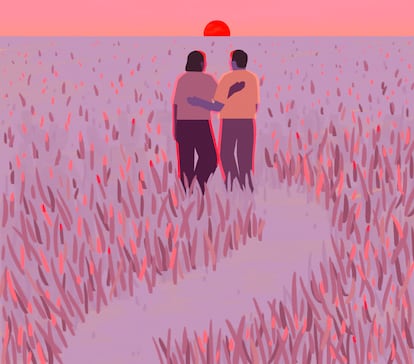Love is a drug that only works for 15 months
Neuroscience says that infatuation lasts a maximum of a year and a quarter. After that, the relationship moves on to other phases

In 1997, the French writer Frédéric Beigbeder said that “love lasts three years” in an autobiographically inspired novel of the same title. The author explained that, during the first year after falling in love, the newness of the relationship makes it exciting, and the adrenaline of love makes us overlook the other’s possible defects. In the second year, the passion declines. There tends to be less sex and less communication, as if the topics of conversation were running out. In the third, the differences become noticeable, which is why many people break up or settle into conformism. All this according to Beigbeder, who does not exactly have an optimistic outlook on the world and human relationships. But what does science have to say about this matter?
A quarter century after the publication of that novel, neuroscientist Sara Teller addresses this burning question in her essay Neurocare. Among the cocktail of “drugs” that are released when one falls in love, she explains, there is norepinephrine, “one of those hormones that we release when we feel stress. This increase in norepinephrine causes tachycardia, palpitations, increased blood pressure, makes your hands shake, increases attention and sexual arousal and can cause insomnia.”
Those physiological reactions would explain why people in love suffer from anxiety, especially when the object of their desire does not pay them enough attention. Neuroscience has revealed that those in love even have high levels of cortisol, the stress hormone. “Many of these symptoms are perceived in the heart; perhaps that is why they say that love is felt there and not in the brain,” concludes the author of Neurocare.
Thus, the fact that infatuation expires may simply be a matter of survival. If a person remained permanently in love, they would have altered mental faculties and would not be able to operate normally, which would be detrimental to their work and other aspects of their personal life.
According to anthropologist and biologist Helen Fisher, between 12 and 15 months after love begins, the hormone rush declines and the brain recovers its normal activity, giving us a clearer view of the person that we have in front of us. However, this does not necessarily have to lead to apathy and distancing, as Beigbeder stated; it can also give way to a more serene, sustainable love.
Before moving on to this phase, let’s stop and think about what it would be like to live high on love all the time, neglecting everything else around us, lost in an infinite number of text messages and raging hormones. Everyone has known someone hooked on romance, which makes them change partners frequently to experience the adrenaline over and over. But do they feel happy and fulfilled? Are they at peace with themselves? Or are they like junkies looking for a fix of fleeting love?
Back to neuroscience, after the initial roller coaster of emotions, if we remain with the same person, the biochemistry of the brain changes again. As dopamine and norepinephrine decrease, the prefrontal cortex — the decision-making cortex — recovers its activity and the hypothalamus calms down, lowering the production of the hormones that unleash the passion.
In this mature phase of love, we can clearly see where we are and what long-term project we want to build. If the relationship continues to move forward, oxytocin is released; this is considered the hormone of trust or attachment, as it is produced when we are in contact with our loved ones. According to neuroscience, this occurs even between dogs and their human friends.
If you do not want the passion to decline to the point where the romance ends up looking like a sibling relationship, you need to keep testosterone and dopamine alive in the brain. The former is stimulated by an active sexual life; the latter — the pleasure hormone — can be increased by doing exciting things as a couple:
- Change routines for new activities.
- Foster nourishing conversations. For example, you can have a book club for two.
- Look for common projects that excite you both.
- Share a sense of humor; laugh together at least once a day.
For a long journey together
One example that love can last a lifetime was the marriage between George H.W. and Barbara Bush, which lasted 73 years. The former president was once asked about the secret of their relationship. His reply was: “Both of us have always been willing to go three quarters of the way.”
Neuroscientist Eduardo Calixto states that the brain has three requirements for a relationship to last:
1. Appreciation. You must like your partner physically.
2. Intelligence. We need to admire our life partner; without that, a relationship cannot stand.
3. Recognition. That the couple enjoys professional success.
Francesc Miralles is a writer and journalist who is an expert in psychology.
Tu suscripción se está usando en otro dispositivo
¿Quieres añadir otro usuario a tu suscripción?
Si continúas leyendo en este dispositivo, no se podrá leer en el otro.
FlechaTu suscripción se está usando en otro dispositivo y solo puedes acceder a EL PAÍS desde un dispositivo a la vez.
Si quieres compartir tu cuenta, cambia tu suscripción a la modalidad Premium, así podrás añadir otro usuario. Cada uno accederá con su propia cuenta de email, lo que os permitirá personalizar vuestra experiencia en EL PAÍS.
¿Tienes una suscripción de empresa? Accede aquí para contratar más cuentas.
En el caso de no saber quién está usando tu cuenta, te recomendamos cambiar tu contraseña aquí.
Si decides continuar compartiendo tu cuenta, este mensaje se mostrará en tu dispositivo y en el de la otra persona que está usando tu cuenta de forma indefinida, afectando a tu experiencia de lectura. Puedes consultar aquí los términos y condiciones de la suscripción digital.








































